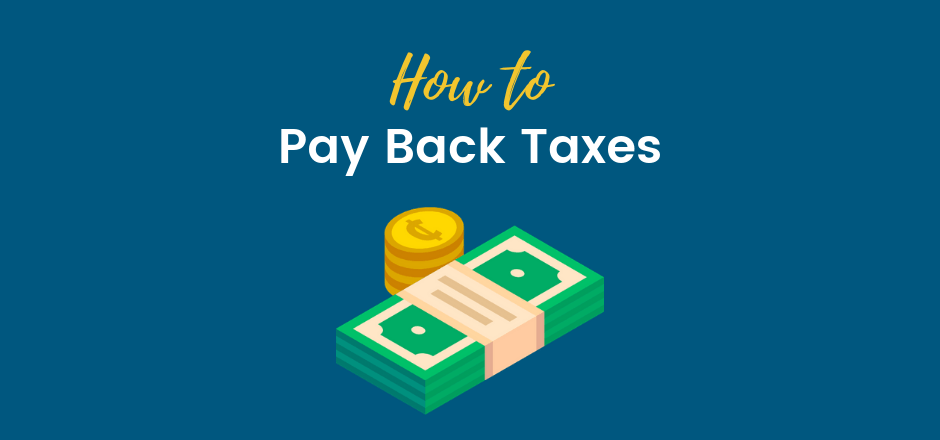How to Pay Back Taxes
If you didn’t pay your taxes one year, you may be contacted by the IRS and penalized. When this occurs, you need to know how to pay back taxes.
This article will guide you through the process so you know how to pay back taxes.

What are Back Taxes Anyway?
If for whatever reason you failed to file and pay your taxes, you may owe money to the IRS. This money is referred to as “back taxes” and they often bring heavy consequences if you don’t resolve the matter quickly.
For this reason, you need to know how to pay back taxes.
To learn more about this, learn more about what happens if you don’t file your taxes.
How to Pay Back Taxes
Do you owe money to the IRS?
Figuring out when and how to pay back taxes can be confusing because available resources on the subject are often lacking. If you’ve been avoiding your tax bill mailouts, you need to know that the IRS isn’t likely to be patient and understanding. Your bill isn’t going to disappear, and neither is your outstanding balance.
It’s time to make a plan for tackling your tax problem.
Related: What does a Tax Attorney Do?
Paying the IRS
It doesn’t matter if you filed your return past the deadline or if you filed on time but just didn’t pay; owing money to the IRS can quickly turn into a tricky situation. If you haven’t filed at all, or you are filing late, the first thing you need to do is get your returns sent in.
Once your returns are filed, you can assess your situation. Do you owe back taxes for one year or several? If you owe because you didn’t file, and have the money available, send your payment in as soon as possible to avoid future late payment fees and penalties.
Don’t have the money to pay? That’s an entirely different situation. The first call you should make should be to the IRS. While hold times are sometimes long, you’ll find they’re actually pretty easy to work with. They are human, after all, and they want to work with you to settle your debt. While you will still be assessed late fees, the representative you speak to can work with you to determine if you qualify for an installment plan. This may make it easier for you to repay your debt over time.
Did you fail to pay because of an unusual situation? Write to the IRS and ask for an abatement. An abatement, if approved, will eliminate or reduce some of the penalties and interest fees you owe. The IRS is usually willing to offer abatements to those who admit to making an honest mistake, or if you or your spouse were seriously ill and simply could not pay.
What is the Fresh Start Program?
The Fresh Start program is an initiative that was passed to make it a little easier for those who owed back taxes to get their bills paid. They could stop worrying about how to pay back taxes and instead explore a series of options. The qualifications for installment agreements have been expanded, allowing those with higher balances to take advantage. They also increased the amount of debt a person could have before the IRS would begin exploring leins.
Another option, considered as a very last resort, is the Offers in Compromise (OIC) program. You may offer a reduced one-time payment as long as it equals the value of your net worth. This option is as serious as bankruptcy and should only be considered if you have no other options.
Can the IRS Freeze My Bank Account?
Yes, they can – but it isn’t as easy as people imagine it is. The IRS has to send you a Notice and Demand, a Notice of Intent to Levy, and a Notice of Right to a Hearing before they can freeze your account. Upon freezing your account, your bank holds your funds for 21 days before actually sending them to the IRS. This gives you another chance to negotiate with the IRS and have your funds released back to you.
Can the IRS Seize My Paycheck?
Yes, the IRS can issue a wage levy or garnishment. It can take anywhere from 11 to 25 weeks for this to go through, depending on how much contact you’ve had with the IRS. The IRS can’t take your entire paycheck. They will look at your tax return to determine your status and if you have dependents. They will stop the levy once you make arrangements to become compliant, either by paying or making arrangements for an installment agreement.
Can I Still Get a Tax Refund?
Absolutely not. The IRS will keep any money you are owed as a refund if you still owe back taxes on a previous year. This is a condition you agree to when you set up an installment agreement.
Will I Go to Jail If I Can’t Pay?
The IRS will not put you in jail simply for failure to pay, though having to deal with levies and garnishments isn’t exactly a walk in the park. The IRS will file criminal charges against you if they can prove you were purposely committing fraud to avoid your taxes. This includes filing a fraudulent return as opposed to not filing a return at all. In many cases, they opt to charge you with civil fines and penalties as opposed to putting you in jail – but it is possible.
What Happens If I Never Pay?
This is a bit tricky. The IRS has 10 years from the date you actually file your tax return to attempt to collect their money. So if, for example, you haven’t filed a tax return from 2009, but file it this year, the IRS has 10 years from now to go through the collection process. Waiting that length of time may land you with a fraud charge, too, especially if you don’t end up filing voluntarily.
While state rules are similar to IRS rules, they each have their own timelines. California law, for example, gives the state up to 20 years from your filing date to attempt to collect.
What Not To Do
Don’t make your financial situation worse by compromising your future to pay your tax debts. Never use a high-interest credit card or take money from your retirement savings to pay your tax debts. You’ll end up spending more in interest and penalties than the solution was worth at the time.
The IRS is a persistent creditor, but it is also reasonable. File your returns voluntarily and touch base with them if you need help. The longer you delay, the more difficult the situation becomes. Contact a tax attorney if you have questions or trouble when it comes to dealing with the agency. They can help pave a path for better communication.
Are you in search for a certified attorney to represent you?
Let us help you find one today!


